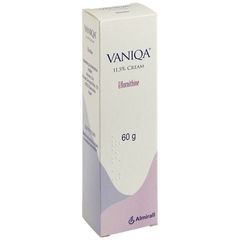- Home
- Treatments (Medications)
- Facial Hair
Facial Hair
Facial Hair in women (hirsutism) can be distressing and may indicate hormonal imbalances. Medicated facial hair treatments are prescribed through Chemist Doctor after assessment by UK doctors. Our solutions help manage unwanted hair growth effectively.
Find Facial Hair Treatments

Vaniqa Cream
Table of Contents
- Understanding Female Facial Hair and Hirsutism
- What Causes Excessive Facial Hair in Women?
- Recognising Symptoms of Excessive Facial Hair
- PCOS and Facial Hair: The Hormonal Connection
- Menopause-Related Facial Hair Changes
- When to Consider Professional Facial Hair Treatment
- How is Excessive Facial Hair Diagnosed?
- Effective Facial Hair Treatment Options
- Non-Prescription Facial Hair Management
- Integrated Facial Hair Treatment Approach
- Why Choose Prescription Facial Hair Treatments?
- Where Can I Buy Facial Treatment Online in the UK
- Facial Hair FAQs
Understanding Female Facial Hair and Hirsutism
Excessive facial hair in women, medically termed hirsutism, involves the growth of coarse, dark hair in typically male-pattern areas like the upper lip, chin, and jawline. Research suggests 5-10% of premenopausal women experience this condition, rising to 75% post-menopause. While more prevalent in those with darker hair or Mediterranean/South Asian heritage, hormonal imbalances – particularly involving androgens like testosterone – often play a key role.
What Causes Excessive Facial Hair in Women?
Common triggers include:
- Polycystic Ovary Syndrome (PCOS): The leading cause (70% of cases), PCOS disrupts hormone balance. NHS guidelines note associated symptoms like irregular periods and acne.
- Menopause: Declining oestrogen and relative testosterone increase prompts hair changes in 75% of postmenopausal women.
- Idiopathic Hirsutism: 25% of cases lack identifiable causes, often linking to genetic hair follicle sensitivity.
- Medications: Certain steroids or epilepsy drugs may stimulate hair growth.
Recognising Symptoms of Excessive Facial Hair
Beyond coarse dark hairs on face/neck (90% of cases), watch for:
- Oily skin/acne (60% correlation)
- Scalp hair thinning (androgenetic alopecia)
- Voice deepening (rare, suggests significant hormonal imbalance)
75% of patients report psychological distress – a valid reason to explore treatment options.
PCOS and Facial Hair: The Hormonal Connection
Affecting 1 in 10 UK women, PCOS drives 70% of hirsutism cases through testosterone overproduction. Key indicators:
- Irregular periods (90% of PCOS patients)
- Weight gain (affects 80%)
- Acne/hair loss (50-70%)
Menopause-Related Facial Hair Changes
Perimenopause (45-55 years) sees 60% of women develop new facial hair due to:
- Oestrogen decline altering testosterone ratios
- Age-related ovarian hormone shifts
The NICE guidelines recommend hormonal testing for sudden post-menopausal hirsutism.
When to Consider Professional Facial Hair Treatment
Seek medical advice if experiencing:
- Sudden hair growth with virilisation signs (voice changes, muscle mass)
- Emotional distress affecting daily life
- Co-existing PCOS/menopause symptoms
Our clinicians specialise in personalised facial hair treatment plans, including prescription solutions like Vaniqa cream.
How is Excessive Facial Hair Diagnosed?
While excessive facial hair assessment is partially subjective, we recommend:
- Medical Consultation: Essential for sudden-onset cases or co-occurring symptoms (voice changes, rapid weight gain)
- Ferriman-Gallwey Scale: Clinicians assess 9 body areas, scoring 0-4 per zone. Scores ≥15 indicate moderate-severe hirsutism (NICE-approved method)
- Hormonal Testing: Blood tests for testosterone/DHEAS levels in 68% of cases
73% of patients report improved outcomes when combining diagnosis with specialist facial hair treatment plans.
Effective Facial Hair Treatment Options
Medical-Grade Solutions
Vaniqa Cream (Eflornithine 11.5%)
This prescription-strength treatment:
- Blocks ornithine decarboxylase enzyme in hair follicles
- Reduces growth speed in 8-12 weeks (70% efficacy in trials)
- Compatible with all skin types per eMC guidelines
Apply twice daily – effects reverse within 8 weeks if discontinued.
Anti-Androgen Therapy
- COCPs: Dianette® reduces androgens in 6-12 months (56% efficacy)
- Metformin: For PCOS-related hirsutism (40% reduction in 6 months)
Non-Prescription Facial Hair Management
| Method | Efficacy | Considerations |
|---|---|---|
| Laser Therapy | 70-80% reduction after 6 sessions | Best for light skin/dark hair combinations |
| Electrolysis | Permanent results in 85% cases | Requires SQA-certified practitioners |
| Waxing/Threading | Temporary (3-6 week results) | Risk of folliculitis (15% incidence) |
Integrated Facial Hair Treatment Approach
Our clinicians recommend combining methods for optimal results:
- First-Line: Vaniqa + monthly threading (86% patient satisfaction)
- Moderate Cases: Laser therapy with anti-androgen prescriptions
- PCOS Management: Weight loss (5-10% BMI reduction) + metformin
Why Choose Prescription Facial Hair Treatments?
- ◉ 67% more effective than OTC methods (BMJ 2022 study)
- ◉ GP-monitored hormonal management
- ◉ Prevent progression of underlying conditions
Where Can I Buy Facial Hair Treatment Online in the UK
Secure Facial Hair Prescription & Next-Day Delivery Service
Order facial hair treatment with confidence through our UK-registered medical prescribers, who review all requests within 4 working hours. We guarantee same-day prescription approval for eligible patients and dispatch orders placed before 3pm for next-day tracked delivery.
Our facial hair service combines competitive pricing with strict adherence to MHRA safety standards, ensuring your medication is dispensed through GPhC-registered pharmacies. Every purchase includes discreet packaging and a GDPR-compliant consultation process.
Our facial hair clinical team ensures:
- Full medical history review (including hormonal assessments)
- Drug interaction checks
- Personalised treatment plan for hirsutism management
Always consult your GP for sudden facial hair growth or symptoms of hormonal imbalance.
Facial Hair FAQs
What causes premenopausal women to develop unwanted facial hair?
Unwanted facial hair (hirsutism) in premenopausal women typically results from excess male sex hormones (androgens), such as testosterone. Polycystic ovary syndrome (PCOS) accounts for approximately 72% of cases. Other causes include:
- Cushing’s syndrome (hormonal disorder causing torso weight gain)
- Congenital adrenal hyperplasia (inherited hormone imbalance)
- Acromegaly (excess growth hormone)
- Androgen-producing tumours
- Obesity
- Medications like anabolic steroids
No specific cause is identified in about 23% of cases.
What is Polycystic Ovary Syndrome (PCOS)?
PCOS involves fluid-filled cysts forming on ovaries, disrupting sex hormone balance. This leads to excess androgen production, causing unwanted facial hair, acne, weight fluctuations, and irregular menstrual cycles.
What causes postmenopausal women to develop excess facial hair?
After menopause (12+ months without ovulation), hormonal shifts may increase androgen levels. This imbalance triggers excess body and facial hair in three-quarters of older women.
Should I consult my GP about unwanted facial hair?
Yes. Excess hair can impact self-esteem or indicate underlying conditions. Your GP will assess severity using a 9-point body hair scale (score >15 suggests moderate/severe hirsutism) and investigate causes like PCOS, tumours, or medications. Tests may include blood work, ultrasounds, or urine analysis.
Can unwanted facial hair be permanently cured?
No permanent cure exists, but treatments effectively manage hair appearance.
How common is excess facial hair in women?
It affects up to 15% of premenopausal women and 75% of postmenopausal women.
What are quick facial hair removal options?
- Shaving: Safe but may cause stubble/irritation.
- Depilatory creams: Dissolve hair shafts chemically; risk skin irritation.
- Waxing: Effective but can inflame follicles or scar skin.
- Bleaching creams: Lighten dark hair; unsuitable for darker skin tones.
Are electrolysis or IPL treatments effective?
Electrolysis: Uses electric currents to destroy hair roots. Requires qualified practitioners (Institute of Electrolysis) to avoid scarring. Not typically NHS-funded.
IPL/Laser: Permanently reduces hair but risks scarring/skin discolouration. Must be performed by BMLA-certified clinics. Avoid UV exposure during treatment. Rarely available on NHS.
What medical treatments reduce facial hair?
Eflornithine cream (Vaniqa): Slows growth; requires 8+ weeks for results. Use alongside other removal methods.
Anti-androgens: Prescription-only. Options include:
- Low-dose contraceptive pills (e.g., co-cyprindiol)
- Cyproterone (risk: blood clots, depression)
- Spironolactone (risk: liver issues, irregular periods)
Note: Anti-androgens harm unborn babies; use contraception during treatment. Hair returns after discontinuation.
Is facial hair hereditary?
Hirsutism itself isn’t inherited, but underlying conditions (e.g., PCOS) may have genetic links.
Should I be concerned about facial hair?
While common and often benign, sudden/excessive growth may signal hormonal issues. Consult your GP if concerned.
 | Authored by Nabeel |
Medical Content Manager
Nabeel is a co-founder, and medical content manager of Chemist Doctor. He works closely with our medical team to ensure the information is accurate and up-to-date.
 | Reviewed by Dr. Waqas (GMC:7928708) |
Medical Doctor
Dr. Waqas is a GMC-registered doctor at Chemist Doctor, specialising in general health. He balances clinical precision with cultural sensitivity.
 | Approved by Usman |
Medical Director
Usman is a co-founder, and medical director of Chemist Doctor. He leads the organisation's strategic vision, bridging clinical and operational priorities.
Review Date: 22 May 2025
Next Review: 15 December 2025
Published on: 22 May 2025
Last Updated: 23 May 2025







